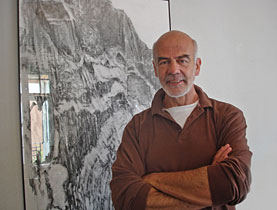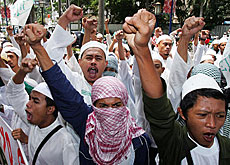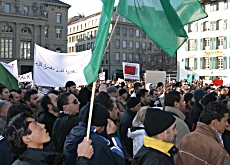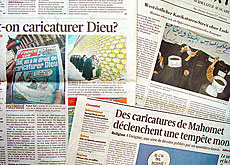“Only idiots are against freedom of expression”

Swiss illustrator Martial Leiter tells swissinfo that "sacred cows" are not confined to religion and that people should beware of hypocrisy.
He discusses whether there are ever limits to freedom of expression and warns that religious cartoons are easily misunderstood.
Leiter has just been taking part in a debate about the tension between cartoons and religion at the Centre Dürrenmatt in Neuchâtel, which houses the works of Swiss painter and dramatist Friedrich Dürrenmatt.
swissinfo: The significance of religion in the writing and painting of Dürrenmatt, who was the son of a Protestant pastor, is striking. How important is religion for you?
Martial Leiter: Religion has always interested me as part of the human condition– both as it affects me personally and in the context of society. Indeed, it is just as important for me as it was for Dürrenmatt. Admittedly for different reasons, since my father wasn’t a pastor but a watchmaker.
swissinfo: You became well known through your political illustrations and cartoons. When did you start working with religious themes?
M.L.: When I was younger I did drawings on religious themes that might be considered provocative. Later I stopped doing them. But meanwhile we’ve started treating political themes in a “religious” way.
swissinfo: How do you mean?
M.L.: There’s an unexpected intertwining between religion and politics. In our society, where church and state are separated, there is something slightly religious in the way that politics now works. Often factual disputes are imbued with an almost religious aura. Politicians portray themselves as saviours. Nowadays politics achieves the effects that used to be achieved by the church.
swissinfo: Why are cartoons with religious subjects especially sensitive?
M.L.: Subjective interpretation plays a large role, so people are quicker to feel they are being attacked than they are with political subjects.
When I’ve used religious symbols it’s not usually been anything to do with a religious topic, but because I wanted to draw a parallel, or to illustrate an allegory or an analysis. But the purpose has often been misunderstood – people read the symbolism literally and then feel offended.
swissinfo: For example?
M.L.: Years ago the French newspaper Le Monde published one of my drawings which was targeting the apparent ubiquity of ethicists and moral authorities who judge what is good and what is bad. This moral finger-pointing bothers me.
In the picture three scholars were gathered at the foot of the cross on which Jesus was being crucified. You only saw the bottom of the cross with the nailed feet. The caption read: “An ethics commission checking whether the nails have been disinfected satisfactorily.”
That’s not criticising religion in the slightest. I used the picture of an execution which is familiar to everyone in our Christian culture to show that by concentrating on something as minor as disinfected nails, people failed to see that someone was being executed. But some people accused me of making fun of religion.
swissinfo: In 2006 cartoons of the prophet Mohammed were published in several European newspapers and caused outrage among some Muslims, who spoke of blasphemy. Other people called it freedom of expression. What was your reaction?
M.L.: First of all I thought they were bad cartoons. They didn’t deserve all the attention they got. They displayed an ignorance or a misunderstanding of the Islamic world.
I strongly believe that we should be free to criticise our own sacred cows, but for us these actually have more to do with the economy. You’ll get very heated reactions about them too – even if no-one would go as far as issuing a fatwa, as happened in the Islamic world.
swissinfo: Are there limits to freedom of expression?
M.L.: Freedom of expression is a human right. Only idiots are against it. But is publishing those cartoons freedom of expression? Freedom of expression does not mean simply saying whatever you want, however stupid it is and however much it offends certain people.
When these people then protest, they are accused of being against freedom of expression, but that is hypocritical. The media fanned the flames too.
What we should be concerned with is practising freedom of expression here in Switzerland, and in areas that are considerably more sensitive than religion. When economic interests are at stake, it is taboo in Switzerland to criticise them, because that is considered to damage a company’s image.
We should sweep our own backyard first – or to put it as the Bible does: “Why do you see the speck in your neighbour’s eye, but do not notice the log in your own eye?”
swissinfo: Have any of your drawings ever been rejected?
M.L.: Many times. In the Seventies and Eighties the taboos were different. In those days the Swiss army was completely off limits. Today the army is considered almost as irrelevant as religion; back then you were immediately accused of being a traitor. Until the Berlin Wall fell in 1989, if you slagged off the Swiss army you were suspected of being in the pay of Moscow.
swissinfo-interview: Susanne Schanda
Martial Leiter was born in Fleurier, canton Neuchâtel, in 1952. He now lives in Lausanne.
After an apprenticeship as a technical illustrator, he began experimenting with engravings and lithographs. He also worked with Indian ink and pencil.
He became well known as a cartoonist for big Swiss, German and French newspapers such as Tages-Anzeiger, Wochenzeitung, Die Zeit, Frankfurter Allgemeine and Le Monde.
Several of his books have been published by Limmat.
On September 30, 2005 12 satirical cartoons each featuring Mohammed appeared in the Danish daily newspaper Jyllands-Posten.
The images provoked a wave of protests in the Muslim world, with many condemning the cartoons as an outrage as Islamic tradition bans depictions of the prophet or Allah.
The cartoons were later reprinted by several European newspapers.

In compliance with the JTI standards
More: SWI swissinfo.ch certified by the Journalism Trust Initiative



You can find an overview of ongoing debates with our journalists here . Please join us!
If you want to start a conversation about a topic raised in this article or want to report factual errors, email us at english@swissinfo.ch.